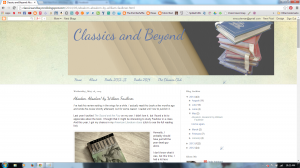 This past week we recorded a podcast with BYU English alumna Rachel Rueckert. Here’s a recent online article she wrote about her experiences in India that got 27,000 shares. On top of freelance travel writing, Rachel is working for Harvard University, creating MOOCs (massive open online courses). In her interview with BYU English Society’s “My Story” host, Davis Blount, Rachel said, straight up, that she would not have had her Harvard job or her travel writing opportunities if she had not learned to blog while at BYU.
This past week we recorded a podcast with BYU English alumna Rachel Rueckert. Here’s a recent online article she wrote about her experiences in India that got 27,000 shares. On top of freelance travel writing, Rachel is working for Harvard University, creating MOOCs (massive open online courses). In her interview with BYU English Society’s “My Story” host, Davis Blount, Rachel said, straight up, that she would not have had her Harvard job or her travel writing opportunities if she had not learned to blog while at BYU.
Maybe you should be blogging.
My students have gotten internships based off of their blogging. They have been solicited to submit articles to journals. They have demonstrated publicly that they can think things through, work on projects with others, and build their ideas in response to the interactions they’ve sought out socially, online, with experts and interested parties rather than keeping their thoughts between them, their computer, and their teachers. Blogging has given them street cred they have banked on.
If you are an undergraduate, your experience with social media has probably been mostly very casual — connecting with existing friends, and maybe following a sports team or celebrities. That’s okay. But it isn’t enough. Why do I teach blogging? Because I want my students
- to practice serious online writing and serious uses of social media
- to connect with people beyond the classroom, the university, or the moment
- to learn to collaborate
- to get some legitimacy within the dominant medium
 The English Society has a world of content and good purposes about which students can blog.
The English Society has a world of content and good purposes about which students can blog.
Our blog isn’t just a broadcast channel, another way to get the word out! It’s a proving grounds for English majors who are smart enough to realize they need to make their thinking public and practice collaborating within teams, and who realize that this is a chance to practice a skill that isn’t in the official university curriculum. Neither is getting a job, or making a name for yourself, of course.
We didn’t ask Rachel, but if she had to do it over again, I’m sure she would say that the time she spent honing her skills for writing online was as consequential as all the other good things she learned while an undergraduate.
So, blog. Blog together. Blog to make a difference for the club, for yourself, and for the future.

